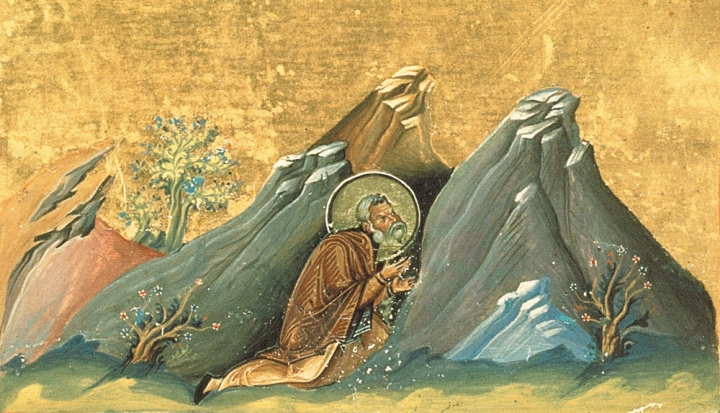The desert mothers and fathers have much to teach Catholics about contemplation and prayer. In the third- to sixth-century desert landscape of Egypt, Syria, Palestine, and Arabia, a powerful movement was happening. Christian monasticism began flowering in response to a call to leave the world behind. Christians withdrew from a society in which the misuse of human relationships, power, and material possessions ran counter to their sense of the sacredness of life.
Their journey into the desert was a movement toward growing intentional awareness of God’s presence and recognizing that worldly pleasures bring little long-term satisfaction. Their aim was to experience God in each moment and activity by reducing their needs and committing themselves to the discipline of regular prayer and self-inquiry.
In this time and place, a literary genre emerged that was similar to parables and proverbs: teaching through story to impart wisdom. These stories, by both the desert fathers and mothers, were gathered together in a text called Sayings of the Desert Fathers (Apophthegmata Patrum). We can read these stories much as we would read the parables in the gospels, as wisdom stories that invite us into spiritual practice rooted in ancient ways.
Give me a word
A monk once came to Basil of Caesarea and said, “Speak a word, Father”; and Basil replied, “Thou shalt love the Lord thy God with all thy heart”; and the monk went away at once. Twenty years later he came back, and said, “Father, I have struggled to keep your word; now speak another word to me”; and he said, “Thou shalt love thy neighbor as thyself”; and the monk returned in obedience to his cell to keep that also.
—(Sayings of the Desert Fathers, Foreword)
“Give me a word” is a key phrase repeated often by the desert elders. This tradition of asking for a word was a way of seeking something on which to ponder for many days, weeks, months, or sometimes a whole lifetime. The “word” was often a short phrase to nourish and challenge the receiver. It was meant to be wrestled with and slowly grown into.
Desert practice Listen for a word in your own life. It could be a phrase while hearing the scripture proclaimed at Mass on Sunday or something a friend says to you that seems to “shimmer” or catch your attention. Ponder it and sit with it. Write it on a piece of paper and put it somewhere you will see it each day.
The inner cell
“Go, sit in your cell, and your cell will teach you everything.”
—(Sayings of the Desert Fathers, Moses)
The desert fathers and mothers each lived alone in a simple hut or room called “the cell.” The monastic cell is a central concept in this spiritual path. The outer cell is a metaphor for the inner cell, a symbol of the deep soul work we are called to in order to become fully awake. It is the place where we come into full presence with ourselves and all of our inner voices, emotions, and challenges. We are encouraged not to abandon ourselves in the process through distraction or numbing. It is also the place where we encounter God deep in our own hearts.
Desert practice Make a commitment to spend some time in solitude and silence for a half hour each week. If you do not have a room available where you can close the door for privacy, then a walk in the woods or in a park will do. Turn off any distractions from your cell phone or computer. Sit there open to God’s whispers. When you notice yourself feeling uncomfortable or wanting to go do something else, commit to staying there and bringing compassion to yourself.
Heart-centered spirituality
[Abba Poemen] said, “Do not give your heart to that which does not satisfy your heart.”
—(Sayings of the Desert Fathers, Poemen)
For the desert elders, the heart was the source of words and actions. They considered it an “axial” organ that centers the physical and spiritual dimensions of human life. The desert elders saw the heart as the center of our being, the place where we encounter God most intimately. Do not give your heart to that which does not satisfy your heart. It seems elementary. Yet as human beings we daily give our hearts over to things that aren’t satisfying or renewing. We make choices that draw us away from our deepest passions and desires. Each time I choose to not sit for a time of prayer, to numb myself with endless hours of social media or television, or to withdraw from the ones I love most, I give myself over to that which does not satisfy.
Desert practice In your weekly cell time of solitude, reflect in particular on where your heart is in alignment with God’s desires for you. Where do you give yourself to things that are truly and deeply nourishing for yourself and others? What are the things you give yourself to that are depleting? Another essential desert practice is having a soul friend for guidance. Ask someone you trust to reflect back to you the places in your life they see as possibly out of alignment with the divine presence.
Humility and being a beginner
[Abba Poemen] said about Abba Pior that every single day he made a fresh beginning.
—(Sayings of the Desert Fathers, Poemen)
The desert monks tried to practice what Buddhists call “beginner’s mind.” In his Rule, St. Benedict counsels us to always remember that we are only beginners on the spiritual path. The moment we think we have it all figured out, the further we are from the spiritual path. Conversely, while we may think we have fallen away too far to return, we are also doomed if we never try at all. No matter how far we feel we have strayed from our practice, we are always invited to begin again. Not just each day, but each moment offers us the chance to lay a new foundation. In Listen to the Desert (Liguori Publications), author Gregory Mayers writes about the times we want to give up our spiritual practice, especially due to boredom, and how these times are when the practice is purifying us and our attachments, working as prayer should. The desert calls us over and over to commitment: “There are only three stages to this work: to be a beginner, to be more of a beginner, and to be only a beginner” (Thomas Merton, Wisdom of the Desert, New Directions).
Desert practice The wisdom of the desert elders reminds us that any time we feel like we are not making progress or should be farther along the path, we must remember we are always beginners in this life. Next time you want to compare yourself to others or give up your practice for a period of time, gently bring yourself back with humility and compassion and make a commitment to begin again.
The desert is a doorway
The desert is a place of deep encounter, not of superficial escape. It is a place of being stripped down to the essentials and that forces us to let go of all the securities we cling to in life, even our images of God, so they might be transformed. Yet through the fierceness of this experience the desert elders saw a doorway to an encounter with a God who is so much more expansive than anything we can imagine. These voices can continue to guide us across the centuries into a place of deep intimacy with the divine presence.
This article also appears in the February 2020 issue of U.S. Catholic (Vol. 85, No. 2, pages 30–32). Click here to subscribe to the magazine.
Image: Wikimedia Commons














Add comment